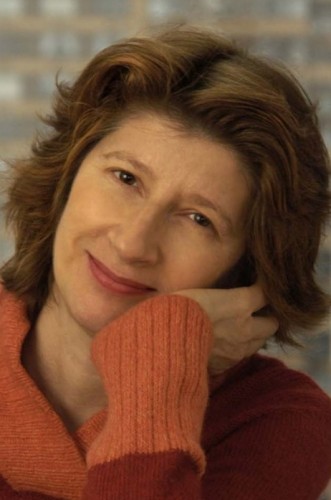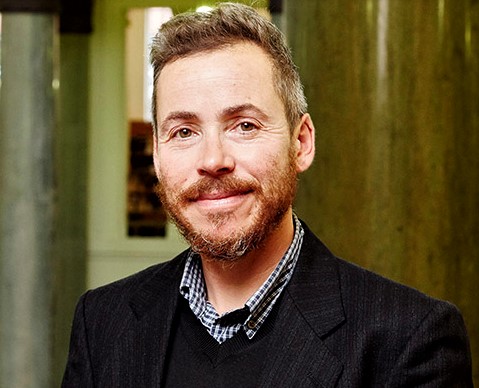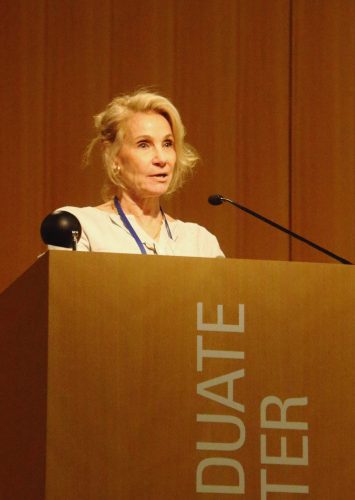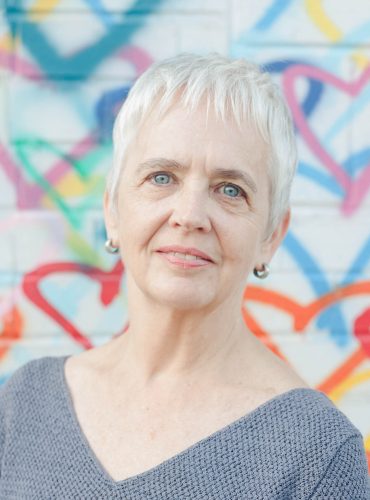January 8th, 2021

Hazel Rowley was a BIO enthusiast since its inception.
BIO’s Hazel Rowley Prize is given to the author of an exceptional book proposal for a full-length biography. In addition to a $2,000 award, the winner will have their proposal evaluated by an established literary agent. They will also receive a year’s membership in BIO, along with registration for the annual BIO Conference, and publicity for the author and project through the BIO website, The Biographer’s Craft newsletter, and social media. The prize is part of how BIO advances its mission and extends its reach to talented new writers in the genre. The deadline for applications is March 1, 2021. Here is more information on how to apply and here is more about biographer Hazel Rowley (1951–2011).
Published under: Awards, Rowley Prize
May 9th, 2020
 Jay Prosser is the 2020 winner of BIO’s Hazel Rowley Prize for his proposal for Empire’s Loving Strangers: Journeys Through an Asian-Jewish Camphorwood Chest, a biography that explores one Jewish family’s experiences and connections across empires and centuries. Prosser is a reader in humanities at the University of Leeds in England, where he has taught since 1999. His book was previously shortlisted for the Tony Lothian Prize for the best unpublished biography, which is given by the Biographer’s Club.
Jay Prosser is the 2020 winner of BIO’s Hazel Rowley Prize for his proposal for Empire’s Loving Strangers: Journeys Through an Asian-Jewish Camphorwood Chest, a biography that explores one Jewish family’s experiences and connections across empires and centuries. Prosser is a reader in humanities at the University of Leeds in England, where he has taught since 1999. His book was previously shortlisted for the Tony Lothian Prize for the best unpublished biography, which is given by the Biographer’s Club.
The Rowley Prize, worth $2,000, goes to a first-time biographer and also includes a careful reading from an established agent; a year’s membership in BIO and registration to the annual conference; and publicity for the author and project. The prize is a way for BIO—an organization of biographers, agents, editors, and biography devotees—to advance its mission and extend its reach to talented new practitioners.
BIO gives the prize in memory of Hazel Rowley (1951–2011), born in London, educated in England and Australia, and a longtime resident of the United States. A BIO enthusiast from its inception, Rowley understood the need for biographers to help and support one another. Before her untimely death, she had written four acclaimed biographies. Rowley was a passionate advocate for the art and craft of biography, a writer of exacting standards, and a generous friend to fellow biographers.
Carla Kaplan, chair of the 2020 Hazel Rowley Prize Committee, interviewed Prosser about his project via email, which you can see here.
Published under: Awards, Rowley Prize
October 11th, 2019

Barbara Fisher, winner of the 2019 Hazel Rowley Prize.
Biographers International Organization (BIO) is now accepting applications for the Hazel Rowley Prize. The prize rewards a biography book proposal from a first-time biographer with: funding (a $2,000 award); a careful reading from an established agent; one year’s membership in BIO (along with registration to the annual conference); and publicity for the author and project through the BIO website, The Biographer’s Craft newsletter, etc. The prize is a way for BIO—an organization of biographers, agents, editors, and biography devotees—to advance its mission and extend its reach to talented new practitioners.
The prize is open to all first-time biographers anywhere in the world who are writing in English; who are working on a biography that has not been commissioned, contracted, or self-published; and who have never published a book-length biography, history, or work of narrative nonfiction. Biography is defined for this prize as a narrative of an individual’s life or the story of a group of lives. Innovative ways of treating a life (or lives) will be considered at the committee’s discretion. Memoirs, however, are not eligible. The deadline for applying is March 1, 2020 . You can find more information about the prize and the application process.
Published under: Awards, Biography, Rowley Prize
Tags: Barbara Fisher
October 8th, 2018
BIO is accepting applications for the Hazel Rowley Prize. The prize rewards a first-time biographer with: funding (the $2,000 award); a careful reading from an established agent; one year’s membership in BIO (along with registration to the annual Biographers International
Organization Conference); and publicity for the author and project through the BIO website, The Biographer’s Craft newsletter, etc. The prize is a way for BIO To advance its mission and extend its reach to talented new practitioners.
The prize is open to all first-time biographers anywhere in the world who are writing in English; who are working on a biography that has not been commissioned, contracted, or self-published; and who have never published a book-length biography, history, or work of narrative nonfiction. Biography is defined for this prize as a narrative of an individual’s life or the story of a group of lives. Innovative ways of treating a life (or lives) will be considered at the committee’s discretion. Memoirs, however, are not eligible.
Learn more about the prize and the application process here.
Published under: Awards, Rowley Prize
July 22nd, 2018
Andrew D. Scrimgeour of Cary, North Carolina, has received the 2018 Hazel Rowley Prize of Biographers International Organization (BIO) for best book proposal from a first-time biographer. Scrimgeour’s proposal for The Man Who Tried to Save Jesus: Robert W. Funk and The Jesus Seminar—about one of the most controversial figures in modern biblical scholarship—was selected by distinguished biographers Stacy Schiff and James Atlas.
Scrimgeour’s proposed biography would chart Funk’s career, which revolutionized the study of biblical texts. For two decades, through his signature creation, the Jesus Seminar, he attracted more sustained media attention in the United States than any religious authority other than the Pope.
In addition to the $2,000 cash award, the Rowley Prize helps a promising first-time biographer by providing introductions to prominent agents. The prize also includes a year’s membership in BIO and publicity on the BIO website and The Biographer’s Craft newsletter.
The prize was named in memory of Hazel Rowley (1951-2011). A BIO enthusiast from the inception of this organization, she understood the need for biographers to help one another on the path to publication. Before her untimely death, she published four books: Christina Stead: A Biography (a New York Times “Notable Book”); Richard Wright: The Life and Times (a Washington Post “Best Book”); Tête-à-Tête: Simone de Beauvoir and Jean-Paul Sartre; and Franklin and Eleanor: An Extraordinary Marriage.
You can find more information about the prize and the application process here.
Published under: Awards, Biography, Rowley Prize
Tags: Andrew D. Scrimgeour
October 7th, 2017
BIO is now accepting applications for the 2018 Hazel Rowley Prize. The aim of this prize is to help a first-time biographer of real promise in four ways: through funding (the $2,000 prize); by securing a careful reading from at least one established agent; a year’s membership in Biographers International Organization (BIO); and publicity through the BIO website and The Biographer’s Craft newsletter, among other outlets.
The prize is named in memory of Hazel Rowley (1951–2011), who was born in London, educated in England and Australia, and was a longtime resident of the United States. A BIO enthusiast from its inception, Hazel understood the need for biographers to help each other. The prize named for her will be given for the fourth time at the next BIO conference, in late spring 2018. Judges for the 2018 prize are the distinguished biographers Stacy Schiff and James Atlas.
The prize is open to citizens or permanent residents of the U.S. and Canada who write in English, are working on a biography that has not been commissioned, contracted, or self-published, and who have never published a biography, history, or work of narrative nonfiction. Biography, as defined for this prize, is a narrative of an individual’s life. Although, group biographies and innovative ways of treating lives will be considered. To apply, click here. The deadline for entries is March 1, 2018.
Published under: Awards, Biography, Rowley Prize
Tags: Hazel Rowley
May 10th, 2017
 Diana Parsell is the winner of BIO’s 2017 Hazel Rowley Prize, given for the best proposal for a first biography. Parsell’s book is titled A Great Blooming and is a biography of Eliza Ruhamah Scidmore, who had the idea to plant Japanese cherry trees in Washington, D.C., and made it happen. Parsell will receive a $2,000 prize, a careful reading from at least one established agent, one year’s membership in BIO, and publicity through the BIO website, The Biographers Craft, and other outlets. She will receive her honor on May 20 at the BIO Conference in Boston.
Diana Parsell is the winner of BIO’s 2017 Hazel Rowley Prize, given for the best proposal for a first biography. Parsell’s book is titled A Great Blooming and is a biography of Eliza Ruhamah Scidmore, who had the idea to plant Japanese cherry trees in Washington, D.C., and made it happen. Parsell will receive a $2,000 prize, a careful reading from at least one established agent, one year’s membership in BIO, and publicity through the BIO website, The Biographers Craft, and other outlets. She will receive her honor on May 20 at the BIO Conference in Boston.
Parsell previously was a winner of the Mayborn/BIO Biography Fellowship, which provided her with a creative residency in Santa Fe, New Mexico.
Parsell told TBC that the prize “offers a shot in the arm. Now several years into this project, I’d been suffering a heavy dose of book fatigue. The sense of validation that comes from this will help energize me for the final spurt.”
The project, she said, has been rewarding, as she tries to reconstruct Scidmore’s life from many pieces. “Published information about her has been sketchy, and in many cases inaccurate, with factual errors perpetuated over the years. I like the satisfaction that comes from getting at the truth through records and other evidence.” Most of Scidmore’s personal papers were burned after she died, but Parsell said she was “an extraordinarily prolific writer,” leaving seven books and about 900 articles. This formed a “great ‘paper trail’ for chronicling her travels in the U.S. and across Asia. On top of that, she lived from the Civil War to post-WWI, so that’s a lot of historical context to grasp. Handling it all has felt overwhelming at times.”
Parsell noted that she started this project around the time BIO was founded, and she called BIO “a terrific resource . . . for a novice biographer like me. The newsletter is a gem of useful information, and I always learn good stuff at the conferences. What I like best is how BIO provides, in a democratic spirit, a supportive environment for members ranging from beginners to pros.”
Published under: Awards, Rowley Prize
Tags: Diana Parsell, Mayborn/BIO Biography Fellowship
April 9th, 2017
The 2017 Hazel Rowley Prize Committee has chosen three finalists for BIO’s award for the best proposal for a first biography. They are, in alphabetical order:
- Eric M. Nishimoto, for Arthur’s War, the story of his uncle, Arthur Nishimoto, a volunteer in the segregated, all-Japanese 442nd Regimental Combat Team that fought in Europe during WWII, becoming the most decorated unit in U.S. history.
- Diana Parsell, for A Great Blooming, the biography of Eliza Ruhamah Scidmore, an intrepid late-nineteenth/early-twentieth century American traveler to Asia, who had the idea to plant Japanese cherry trees in Washington, D.C., and made it happen.
- Jeffrey Lawrence Yastine, for Battle the Wind: Elmer and Lawrence Sperry, father and son inventors and aircraft pioneers from the first half of the twentieth century, whose legacy lives on in the technology we take for granted today.
The final judging is being done by distinguished biographers Blake Bailey and Amanda Vaill. The winner will be announced prior to the BIO conference in May and will receive the prize there. The winner receives a $2,000 prize, a careful reading from at least one established agent, a year’s membership in BIO, and publicity through the BIO website, The Biographer’s Craft, and other outlets.
The members of the Hazel Rowley Prize Committee are Susan Butler, Jennifer Cockburn, Cathy Curtis, Kavita Das, Deirdre David, Gayle Feldman, Dean King, and Roy Schreiber.
Published under: Awards, News, Rowley Prize

 Jay Prosser is the 2020 winner of BIO’s
Jay Prosser is the 2020 winner of BIO’s 
 Diana Parsell is the winner of BIO’s 2017 Hazel Rowley Prize, given for the best proposal for a first biography. Parsell’s book is titled A Great Blooming and is a biography of Eliza Ruhamah Scidmore, who had the idea to plant Japanese cherry trees in Washington, D.C., and made it happen. Parsell will receive a $2,000 prize, a careful reading from at least one established agent, one year’s membership in BIO, and publicity through the BIO website, The Biographers Craft, and other outlets. She will receive her honor on May 20 at the BIO Conference in Boston.
Diana Parsell is the winner of BIO’s 2017 Hazel Rowley Prize, given for the best proposal for a first biography. Parsell’s book is titled A Great Blooming and is a biography of Eliza Ruhamah Scidmore, who had the idea to plant Japanese cherry trees in Washington, D.C., and made it happen. Parsell will receive a $2,000 prize, a careful reading from at least one established agent, one year’s membership in BIO, and publicity through the BIO website, The Biographers Craft, and other outlets. She will receive her honor on May 20 at the BIO Conference in Boston.